Intro
Learn about 5 key Hepatic Function Tests, including liver panels, to assess liver health and diagnose conditions like cirrhosis, fatty liver, and hepatitis, using bilirubin, ALT, and AST tests.
The liver is a vital organ that plays a central role in maintaining the body's overall health. It is responsible for filtering toxins, regulating metabolism, and producing essential proteins. Given its importance, assessing liver function is crucial in diagnosing and managing various liver-related conditions. Hepatic function tests are a group of diagnostic tools used to evaluate the liver's performance. These tests are designed to measure the liver's ability to carry out its normal functions, such as detoxification, metabolism, and production of bile and proteins.
Hepatic function tests are essential in clinical practice, as they help healthcare providers diagnose liver diseases, monitor the progression of liver conditions, and assess the effectiveness of treatments. Liver diseases can be asymptomatic in their early stages, making it challenging to diagnose them without the aid of these tests. Moreover, some liver conditions, such as cirrhosis and liver cancer, can have severe consequences if left untreated. Therefore, it is crucial to use hepatic function tests to identify liver problems early on, allowing for prompt intervention and improved patient outcomes.
The importance of hepatic function tests cannot be overstated, as they provide valuable information about the liver's functional capacity. These tests can help identify specific liver disorders, such as hepatitis, fatty liver disease, and liver damage caused by medications or toxins. By analyzing the results of these tests, healthcare providers can develop targeted treatment plans, monitor disease progression, and adjust therapies as needed. Furthermore, hepatic function tests can also be used to assess the liver's ability to recover from injury or disease, which is essential in evaluating the effectiveness of treatments and predicting patient outcomes.
Hepatic Function Test Types
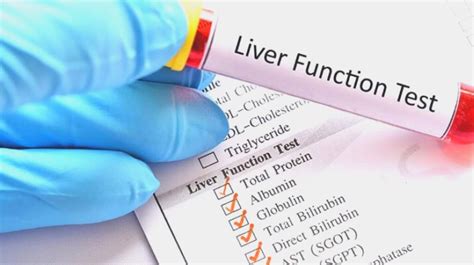
There are several types of hepatic function tests, each measuring different aspects of liver function. These tests can be broadly categorized into two groups: liver enzyme tests and liver function tests. Liver enzyme tests measure the levels of specific enzymes in the blood, which can indicate liver damage or inflammation. The most common liver enzyme tests include alanine transaminase (ALT), aspartate transaminase (AST), alkaline phosphatase (ALP), and gamma-glutamyl transferase (GGT). Elevated levels of these enzymes can suggest liver damage, while decreased levels may indicate liver dysfunction.
Liver Enzyme Tests
Liver enzyme tests are commonly used to diagnose and monitor liver conditions. These tests are usually performed on a blood sample and can provide valuable information about liver health. For example, ALT and AST are enzymes found in liver cells, and elevated levels of these enzymes in the blood can indicate liver damage. ALP and GGT are enzymes found in the bile ducts, and elevated levels of these enzymes can suggest bile duct obstruction or damage.Liver Function Tests
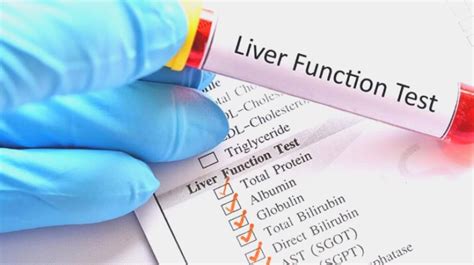
Liver function tests, on the other hand, measure the liver's ability to perform its normal functions, such as detoxification, metabolism, and production of bile and proteins. These tests can include measurements of bilirubin, albumin, and prothrombin time. Bilirubin is a pigment produced during the breakdown of red blood cells, and elevated levels of bilirubin in the blood can indicate liver dysfunction. Albumin is a protein produced by the liver, and low levels of albumin can suggest liver disease. Prothrombin time measures the liver's ability to produce clotting factors, and prolonged prothrombin time can indicate liver dysfunction.
Interpreting Hepatic Function Test Results
Interpreting the results of hepatic function tests requires a thorough understanding of the normal ranges for each test and the clinical context in which the tests were performed. Abnormal results can indicate liver damage or disease, but they can also be influenced by other factors, such as medication use or underlying medical conditions. Therefore, it is essential to consider the results of multiple tests and to correlate them with clinical findings and other diagnostic results.Common Hepatic Function Tests
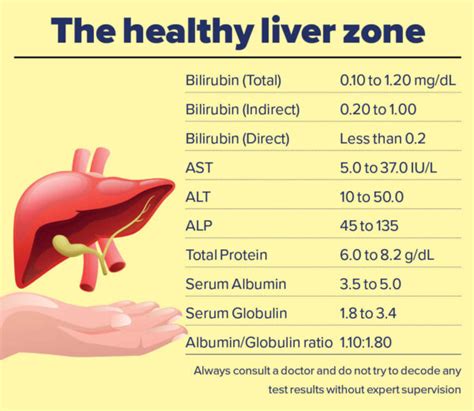
Some common hepatic function tests include:
- Alanine transaminase (ALT)
- Aspartate transaminase (AST)
- Alkaline phosphatase (ALP)
- Gamma-glutamyl transferase (GGT)
- Bilirubin
- Albumin
- Prothrombin time These tests can be used to diagnose and monitor a range of liver conditions, including hepatitis, cirrhosis, and liver cancer.
Advantages and Limitations of Hepatic Function Tests
Hepatic function tests have several advantages, including their non-invasive nature and relatively low cost. These tests can provide valuable information about liver function and can help diagnose liver diseases early on. However, they also have some limitations. For example, some liver conditions, such as cirrhosis, can be present without significant abnormalities in liver enzyme tests. Additionally, some medications and underlying medical conditions can influence the results of these tests, making interpretation challenging.Applications of Hepatic Function Tests
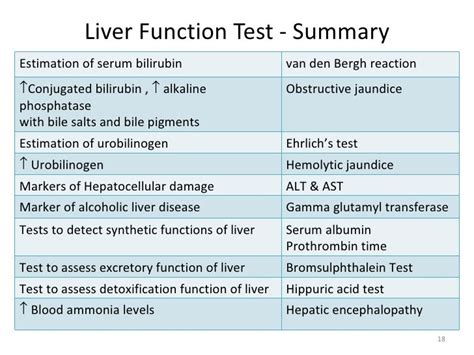
Hepatic function tests have several applications in clinical practice, including:
- Diagnosing liver diseases, such as hepatitis and cirrhosis
- Monitoring the progression of liver conditions
- Assessing the effectiveness of treatments
- Evaluating liver function in patients with underlying medical conditions
- Screening for liver disease in high-risk populations
Future Directions in Hepatic Function Testing
The field of hepatic function testing is constantly evolving, with new tests and technologies being developed to improve the diagnosis and management of liver diseases. Some future directions in hepatic function testing include the development of non-invasive tests that can measure liver fibrosis and the use of artificial intelligence to interpret test results and predict patient outcomes.Conclusion and Recommendations
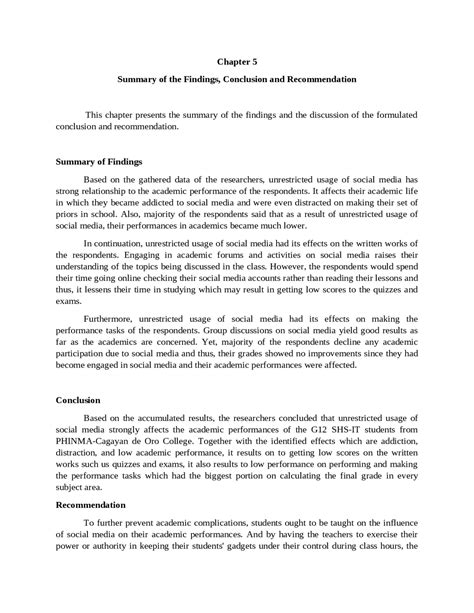
In conclusion, hepatic function tests are essential diagnostic tools that provide valuable information about liver function and health. These tests can help diagnose liver diseases, monitor disease progression, and assess the effectiveness of treatments. While they have some limitations, the advantages of hepatic function tests make them a crucial part of clinical practice. As the field of hepatic function testing continues to evolve, it is likely that new tests and technologies will be developed to improve the diagnosis and management of liver diseases.
We encourage readers to share their thoughts and experiences with hepatic function tests in the comments section below. If you have any questions or concerns about liver health or hepatic function testing, please do not hesitate to ask. Additionally, we invite you to share this article with others who may be interested in learning more about hepatic function tests and liver health.
What is the purpose of hepatic function tests?
+Hepatic function tests are used to evaluate the liver's functional capacity and diagnose liver diseases.
What are the common types of hepatic function tests?
+The common types of hepatic function tests include liver enzyme tests and liver function tests, such as ALT, AST, ALP, GGT, bilirubin, albumin, and prothrombin time.
How are the results of hepatic function tests interpreted?
+The results of hepatic function tests are interpreted by considering the normal ranges for each test and the clinical context in which the tests were performed.
